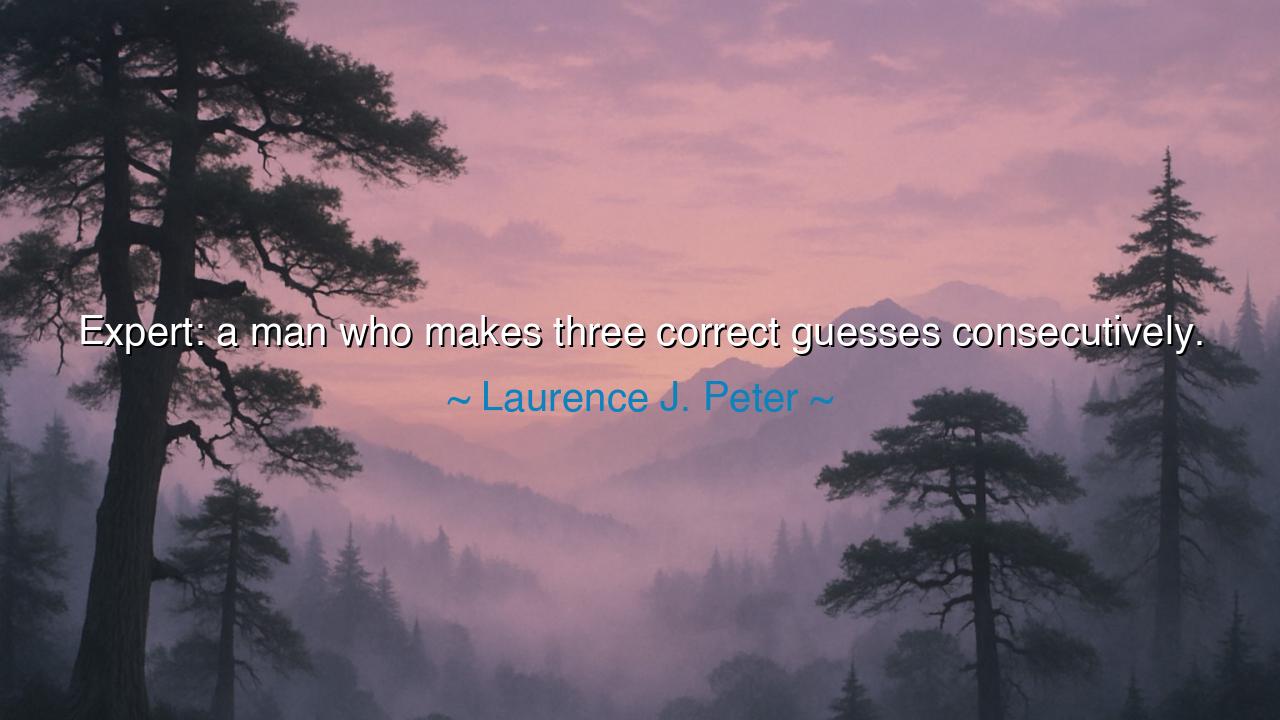
Expert: a man who makes three correct guesses consecutively.






“Expert: a man who makes three correct guesses consecutively.” — Laurence J. Peter
In this wry and timeless saying, Laurence J. Peter, the Canadian educator and satirist best known for formulating the Peter Principle, offers more than a jest about knowledge — he reveals the frailty of human certainty, and the illusion of mastery that so often accompanies it. His humor is gentle but sharp, reminding us that what the world calls expertise is often a chain of fortunate insights mistaken for infallibility. The expert, in Peter’s vision, is not a god of wisdom, but a mortal who has guessed correctly just long enough for others to believe he cannot err. Beneath the laughter lies an ancient warning: beware of those who mistake coincidence for truth, and success for understanding.
The origin of this quote rests in Peter’s larger body of thought, which exposed the hidden ironies of human institutions. In his Peter Principle, he observed that people often rise in organizations not because they are skilled, but until they reach a level where they become incompetent — where their success outpaces their understanding. This quote follows that same spirit. It is not cynicism, but wisdom cloaked in humor: the recognition that human knowledge is fragile, that even the wise build their towers of insight upon foundations of uncertainty. To call someone an “expert,” then, is not to declare perfection, but to acknowledge that, for a time, fortune and discernment have aligned in their favor.
The ancients, too, understood this delicate dance between knowledge and chance. Socrates, who was called the wisest man of Greece, claimed only to know that he knew nothing. He understood that wisdom begins where arrogance ends — that the moment one believes himself an expert, he ceases to learn. Laurence J. Peter, though speaking from the world of modern bureaucracy, channels that same eternal truth: that knowledge is a moving river, not a fixed possession. The true sage does not boast of having guessed rightly, but remains humble before the mystery of the unknown.
There is a story told of Isaac Newton, the great mind who unlocked the laws of gravity and motion. Late in his life, he confessed that he felt like a boy playing on the seashore, finding a smoother pebble or a prettier shell than ordinary, while the great ocean of truth lay undiscovered before him. Though the world hailed him as an expert beyond all others, Newton knew what Peter knew — that mastery is a shadow cast by curiosity, and that even the most brilliant minds are only guessing, however skillfully, at the workings of the infinite. His three correct guesses — gravity, optics, and motion — made him immortal, but his humility kept him wise.
And so, Peter’s humor becomes not mockery, but medicine for the proud. In every age, the world hungers for certainty — for oracles, prophets, and experts who can speak with unshakable confidence. Yet history teaches that certainty is often the mask of error. The “experts” who declared the earth flat, the doctors who prescribed leeches for fever, the economists who foresaw endless prosperity before collapse — all believed their three guesses would hold forever. But truth is not static; it shifts like the wind, and those who clutch it too tightly are left grasping air. The wise, therefore, do not seek to be seen as experts — they seek to remain learners, forever alert, forever questioning.
Still, Peter’s saying carries warmth and humor because it does not scorn the human desire to understand. It accepts our fallibility with grace. To make a correct guess — even one — is a small miracle of observation and courage. To make three in a row is rare enough to earn respect. But to know that your streak may end, to hold your insight lightly, is what separates the wise from the arrogant. The expert, as Peter imagines him, is not the one who is always right, but the one who can laugh when he is wrong. Such laughter is the sound of wisdom unafraid to lose its mask.
So, my child, let this teaching rest in your heart: be wary of certainty, and walk humbly with your knowledge. Rejoice when your guesses are correct, but do not crown yourself infallible. The truly wise never stop doubting, never stop listening, never stop learning. The fool seeks to be called an expert; the sage seeks only to understand. Remember that each guess, each discovery, each success is but one note in the endless song of truth — and to call yourself its master is to stop hearing the melody.
In this way, Peter’s humor becomes a lantern for the mind. Laugh at the arrogance of false mastery, but let it inspire you to stay curious. For the greatest expert, as he teaches us, is not the one who has guessed right three times, but the one who still has the humility to guess again.






AAdministratorAdministrator
Welcome, honored guests. Please leave a comment, we will respond soon